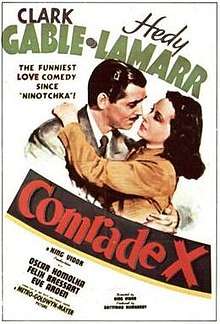Comrade X
Comrade X is a 1940 American comedy spy film directed by King Vidor and starring Clark Gable, Hedy Lamarr, and Oskar Homolka. In February 2020, the film was shown at the 70th Berlin International Film Festival, as part of a retrospective dedicated to King Vidor's career.[2]
| Comrade X | |
|---|---|
 1940 US Theatrical Poster | |
| Directed by | King Vidor |
| Produced by | Gottfried Reinhardt King Vidor |
| Written by | Walter Reisch (story) Ben Hecht Charles Lederer Herman J. Mankiewicz (uncredited) |
| Starring | Clark Gable Hedy Lamarr Oskar Homolka Felix Bressart Eve Arden |
| Music by | Bronislau Kaper |
| Cinematography | Joseph Ruttenberg |
| Edited by | Harold F. Kress |
Production company | |
| Distributed by | Metro-Goldwyn-Mayer |
Release date |
|
Running time | 90 minutes |
| Country | United States |
| Language | English |
| Budget | $920,000[1] |
| Box office | $2,079,000[1] |
Plot
In the Soviet Union, American reporter McKinley "Mac" Thompson (Clark Gable) secretly writes unflattering stories about the Soviet Union, attributed to "Comrade X", for his newspaper. His identity is discovered by his valet, Vanya (Felix Bressart), who blackmails Mac into promising to get his daughter, a streetcar conductor named Theodore (Hedy Lamarr), out of the country. Theodore agrees to a sham marriage so she can spread the message of the benefits of Communism to the rest of the world. However, Commissar Vasiliev (Oscar Homolka) is determined to unmask and arrest Comrade X. Eventually Theodore sees the "wicked hypocrisy of Communism" and falls in love with Thompson. [3][4]
Cast
- Clark Gable as McKinley B. "Mac" Thompson
- Hedy Lamarr as Golubka / Theodore Yahupitz / Lizvanetchka "Lizzie"
- Oskar Homolka as Commissar Vasiliev
- Felix Bressart as Igor Yahupitz / Vanya
- Eve Arden as Jane Wilson
- Sig Rumann as Emil Von Hofer
- Natasha Lytess as Olga Milanava
- Vladimir Sokoloff as Michael Bastakoff
- Edgar Barrier as Rubick, Commissar's Aide
- Georges Renavent as Laszlo, world press attendee (credited as George Renevant)
- Mikhail Rasumny as arresting Russian Officer
Production
- Production on Comrade X began filming in late August 1940.
- The film was nominated for an Academy Award for Best Story.
Gable prophetically jokes that "Germany just invaded Russia" and "Panzer tanks are rolling into Ukraine" to get the Russian hotel manager to kick the German reporter out of his room. Less than a year after release, Germany did indeed invade Russia and the Ukrainian SSR.[5]
Pre-war American films such as Comrade X and Ninotchka also depict the Soviet Union as backwards, dreary, depressing and totalitarian. After the United States entered the war on Russia's side, however, Hollywood's depictions of Russians immediately changed to brave, honorable, freedom-loving liberators. The UK specifically pulled Comrade X from the cinemas.[6]
At one point in the movie, after McKinley feeds vodka to his secretary Olga and embraces her, Golubka enters his room and the women engage in a "hair pulling battle" over his affections that is "hilariously staged".[7][8]
Box office
According to MGM records the film earned $1,520,000 in the US and Canada and $559,000 elsewhere resulting in a profit of $484,000.[1]
References
- The Eddie Mannix Ledger, Los Angeles: Margaret Herrick Library, Center for Motion Picture Study.
- "Berlinale 2020: Retrospective "King Vidor"". Berlinale. Retrieved 28 February 2020.
- Robert Fyne (1997). The Hollywood Propaganda of World War II. p. 103. ISBN 9780810833104.
- Michael J. Strada; Harold Martin Troper; Harold R. Troper (1997). Friend Or Foe?:Russians in American Film and Foreign Policy 1933-1991. p. 31. ISBN 9780810832459.
- Editors, History.com. "Germany launches Operation Barbarossa—the invasion of Russia". HISTORY. History.com. Retrieved 10 August 2020.CS1 maint: extra text: authors list (link)
- Michael Fullilove (2013-04-24). Rendezvous with Destiny. ISBN 9780857970442.
- Shearer, Stephen M. (2013). Beautiful: The Life of Hedy Lamarr. St. Martin's Press. ISBN 9781250041838. Retrieved 2 November 2019.
- "Comrade X". Variety. Retrieved 2 November 2019.
External links
| Wikimedia Commons has media related to Comrade X (film). |
- Comrade X at the American Film Institute Catalog
- Comrade X on IMDb
- Comrade X at AllMovie
- Comrade X at the TCM Movie Database